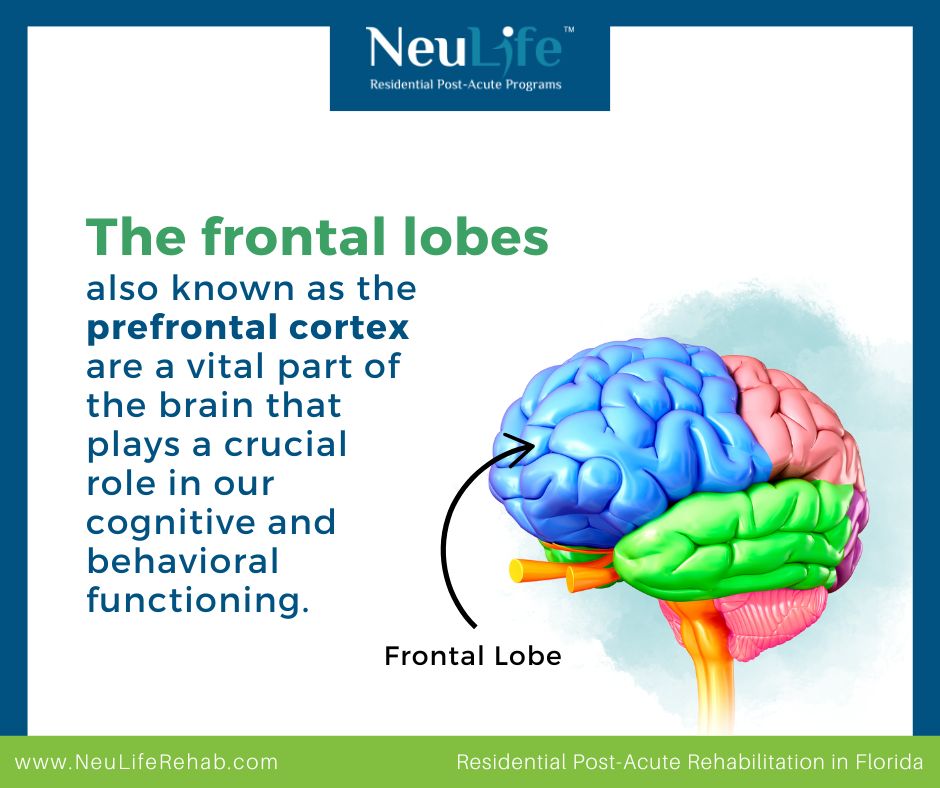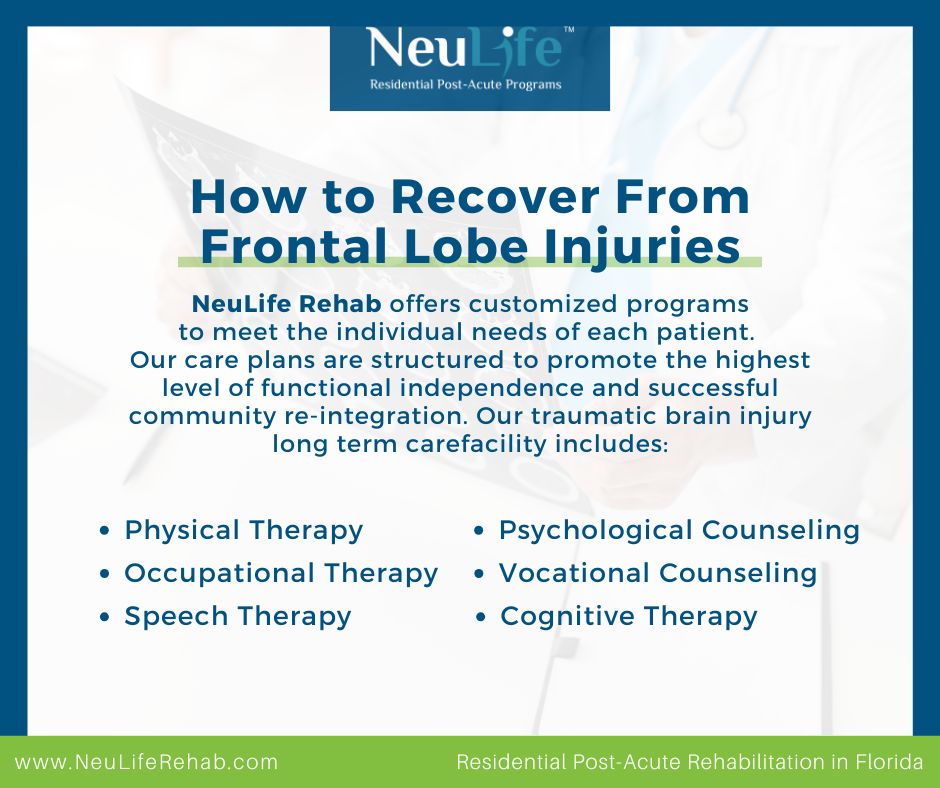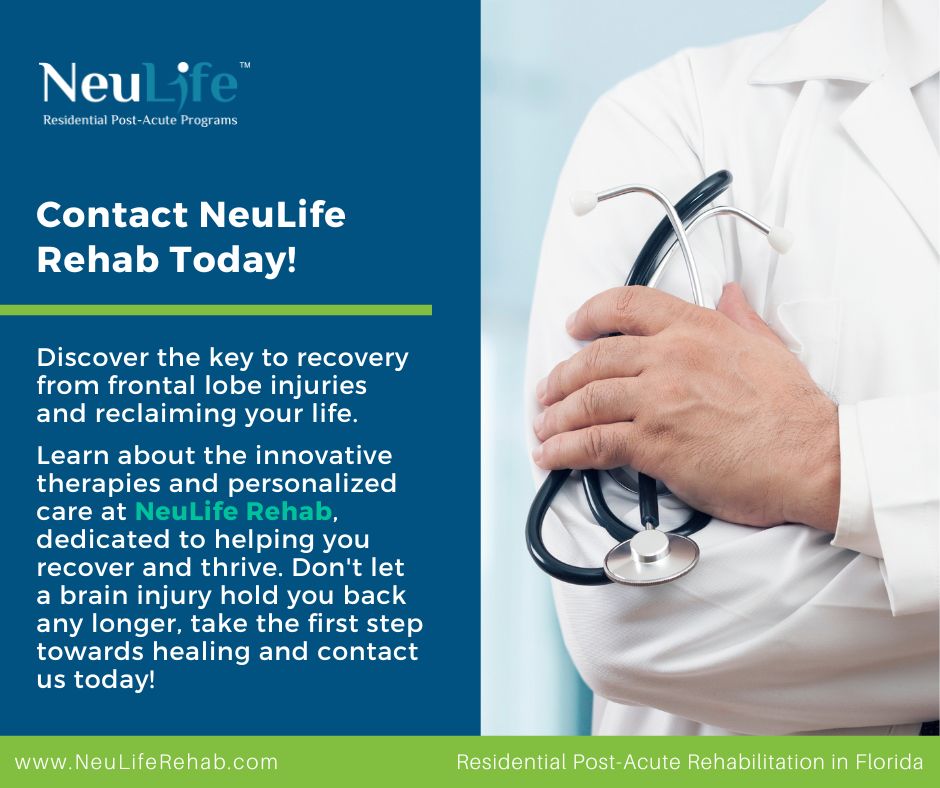The frontal lobes are a crucial part of our brain that plays a significant role in our behavior, thoughts, and emotions. They regulate our decision-making, problem-solving, planning, and other critical cognitive functions. But what happens when these frontal lobes are damaged or impaired? How does it affect our daily life, and what can be done to recover from it?
In this blog post, we will explore the functions of the frontal lobes, what to expect when they are damaged, and how NeuLife Rehabilitation of Florida can help recover through neuro rehabilitation.

The frontal lobes, also known as the prefrontal cortex, are a vital part of the brain that plays a crucial role in our cognitive and behavioral functioning. Located in the front of the brain, just behind the forehead, the frontal lobes are responsible for various functions essential to our daily lives, including:
Frontal lobe injuries can result from a variety of causes, including traumatic brain injuries, strokes, and tumors. These injuries can significantly impact a person’s life, affecting cognitive, emotional, and physical functioning.
Some common symptoms of frontal lobe injuries include:
Due to the critical role the frontal lobes play in regulating emotions, an injury to this brain area may result in personality changes. This can manifest as increased aggression, irritability, and impulsivity.
As mentioned earlier, the frontal lobes are involved in decision-making and problem-solving. When injured, a person may have difficulty making simple decisions or planning steps to reach a goal.
Depending on the severity and location of the injury, a person may experience motor deficits, such as weakness or paralysis on one side of the body, difficulty with coordination and balance, and changes in fine motor skills.
Frontal lobe injuries can also affect a person’s ability to speak and understand language. They may have trouble finding the right words, forming sentences, or understanding what others are saying.
Injuries to the frontal lobes can also impact a person’s memory, making it difficult to remember recent events or learn new information.
Recovering from a frontal lobe injury can be a long and challenging process, but with the proper support and rehabilitation, it is possible.

At NeuLife Rehabilitation of Florida, we understand the complex nature of frontal lobe injuries and the impact they can have on a person’s life. Our team of experienced and compassionate professionals uses a comprehensive, person-centered approach to help individuals recover from their injuries and regain their independence.
Some of the therapies and programs we offer for frontal lobe injury recovery include:
Our occupational therapists work with individuals to improve their daily living skills, such as dressing, grooming, and meal preparation, which may be affected by a frontal lobe injury.
Our physical therapists help individuals improve their strength, balance, and coordination through exercise and other techniques.
Our speech therapists work with individuals to improve their speech and language abilities, including expressive and receptive language skills.
Our cognitive therapists use various techniques to address deficits in memory, problem-solving, and other mental functions affected by a frontal lobe injury.
This type of counseling provides a safe and supportive environment to address and overcome the psychological effects of frontal lobe injuries, leading to improved overall well-being and quality of life.
As we age, taking care of this vital part of our brain is essential to ensure its proper function. Here are some tips for maintaining a healthy frontal lobe.

If you or someone you know has experienced frontal lobe damage, do not lose hope. Recovery is possible, and NeuLife Rehabilitation of Florida can help. Neulife Rehab is one of the largest residential post-acute rehabilitation centers in the southeast specializing in TBI rehabilitation, stroke patient rehab, SCI, Complex Ortho & Neurological Disorders rehabilitation.
Our programs are accredited by the Commission on Accreditation of Rehabilitation, and our experienced and dedicated professionals are committed to providing the best care and support for our client's recovery journey.
To educate and support individuals with frontal lobe damage, we have written a blog titled "What Parts of the Brain are Affected by TBI?" Join us on this journey towards a better tomorrow and schedule a tour of our facility today.
***
The material on this site is for informational purposes only and DOES NOT CONSTITUTE THE PROVIDING OF MEDICAL ADVICE, and is not intended to be a substitute for independent professional medical judgment, advice, diagnosis, or treatment. Always seek the advice of your physician or other qualified healthcare provider with any questions or concerns you may have regarding your health.

We know that choosing the next step in your recovery from a catastrophic illness or injury is complex. Together, we can help you take the next step.
Contact us with any questions today.